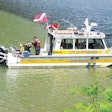There are a few realities of life that we must get out of the way before we begin this discussion.
First, your department should tell you what it will issue to you. This prevents you from purchasing needless items and wasting your money. It should also tell you the items it recommends you have that it will not purchase for you. Finally, it should tell you what it prohibits you to have. Enough said.
You, as a recruit, make very little money, and you do not want to spend your earnings needlessly.
Here are my recommendations for some things you need that your agency is unlikely to provide. This list comes from my experience as a recruit, an FTO, and now a chief.
Carry Bags—Let’s face it, if you have a department that requires you to rotate vehicles, you need a carry bag for your gear.
How do you choose one? First, look at what the other officers are using. One rule of thumb is that you can’t get one too big but you sure can get one too small. I recommend one with storage pockets for external access and a shoulder sling to make it easier for you to hump this thing through the parking lot.
Some guys like hard shell cases. Not me. Yes, they offer more protection, but they don’t expand to accommodate more stuff—there’s always more stuff—and the hard corners make them difficult to fit into a vehicle cockpit.
Whatever bag you buy, make sure it is constructed of quality, durable material that will withstand the rigors of patrol duty. And buy a big one. How big is big enough? Mine was large enough to deploy with the French Foreign Legion and was just right.
A secondary bag for inclement weather gear such as rain coat, gloves, and traffic vest is also a good idea. You want quick access to this stuff. Oh, and don’t forget to throw in a towel or two. If it rains, you’ll get wet, and you’ll wish you had a towel.
A Backup Gun—Yes, (even as a chief) I am a firm believer in a secondary weapon and a quality one at that. Hooah!
Before you purchase a backup gun, talk with your departmental rangemaster and get his or her recommendations. Your department may have guidelines regarding secondary weapons. If so, follow them! Some prohibit backup guns. That’s not good, but you have to follow the rules.
You wouldn’t hit the street with a duty weapon that you didn’t have proficiency with; don’t do it with a backup gun either. Make sure you are totally familiar with the operation of the weapon and how to deploy it from its carry position.
Also, go to the range and shoot your backup gun. Remember, you are not there to qualify and punch paper. Anyone can sling lead. True warriors know the ability of each of their weapons and how to use them under all circumstances.
Don’t wait for someone to tell you to go to the range. Be a frequent visitor, shoot often, and focus on your marksmanship and tactical skills like your life depended on them. It does.
One way to economize on the purchase of your backup gun is to get something that can double as your off-duty weapon. Your agency’s rangemaster can help you choose one that will serve both roles.
Blades and Tools—If your agency permits, buy a good quality folding knife or multi-tool.It is unlikely, very unlikely, that you will ever have to use a blade as a weapon on duty. But believe me, you will use it for a lot of other purposes.
Flashlights—People, a lot of police work is performed in the dark—at night or in dark buildings. You need portable light.
Some agencies issue flashlights. Some don’t. Some issue crappy flashlights but allow you to buy your own. If you are not issued one, do your research on what you like best and buy one. I also recommend that you carry a small secondary flashlight.
You have two lights, don’t you? The small one is for your belt. And here’s why you need it. It is day watch; you chase a perp into a building. Now, you need a light. Or, it is night watch and your primary light goes dim, bulb blows. No worries for you because you have your backup light.
Note: Some agencies regulate what flashlights you can carry. Before you buy one, make sure your agency permits it.
A Hard Surface—You will need a good sturdy writing platform. In other words, get a clipboard. Don’t drop a fortune on an expensive one but find something to write on in a bind.
Cheap but Good Pens—Every graduation, somebody’s mom gives them an expensive pen and pencil set. Leave that one at home. Otherwise, the first ticket you write with it, the violator will keep the pen. Go to Office Depot, Staples, or whatever and buy some cheap but good pens. You’ve been in school enough to know what you like and what you don’t like.
Buy a Small Tackle Box—I always tell my officers to get a small tackle box for the little but essential objects. Paper clips, nail clippers, spare flashlight bulbs, extra back clasps for uniform gadgets, antacids, lumber crayons, extra pens, all need to be corralled up in a box or you won’t be able to find them when you need them.
The Best Advice You Will Get on Buying Gear—Save your money and go on a date. OK, listen to me on this one. Your schedule now as an FTR is going to get hectic; it is going to stress you and your significant other out! Do yourself a favor; rather than dropping your money on gear you don’t need just because you are really into being a cop, grab the one you love, go out to a proper dinner and a nice night on the town. Life is not all about work.

















